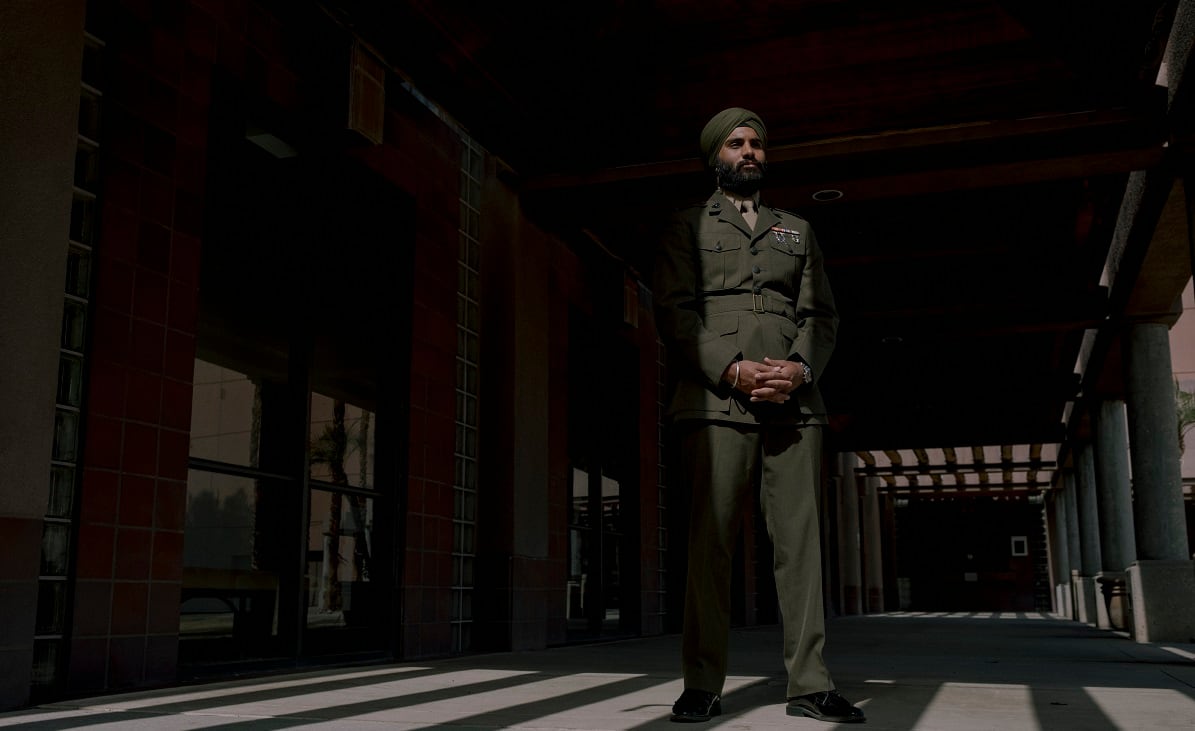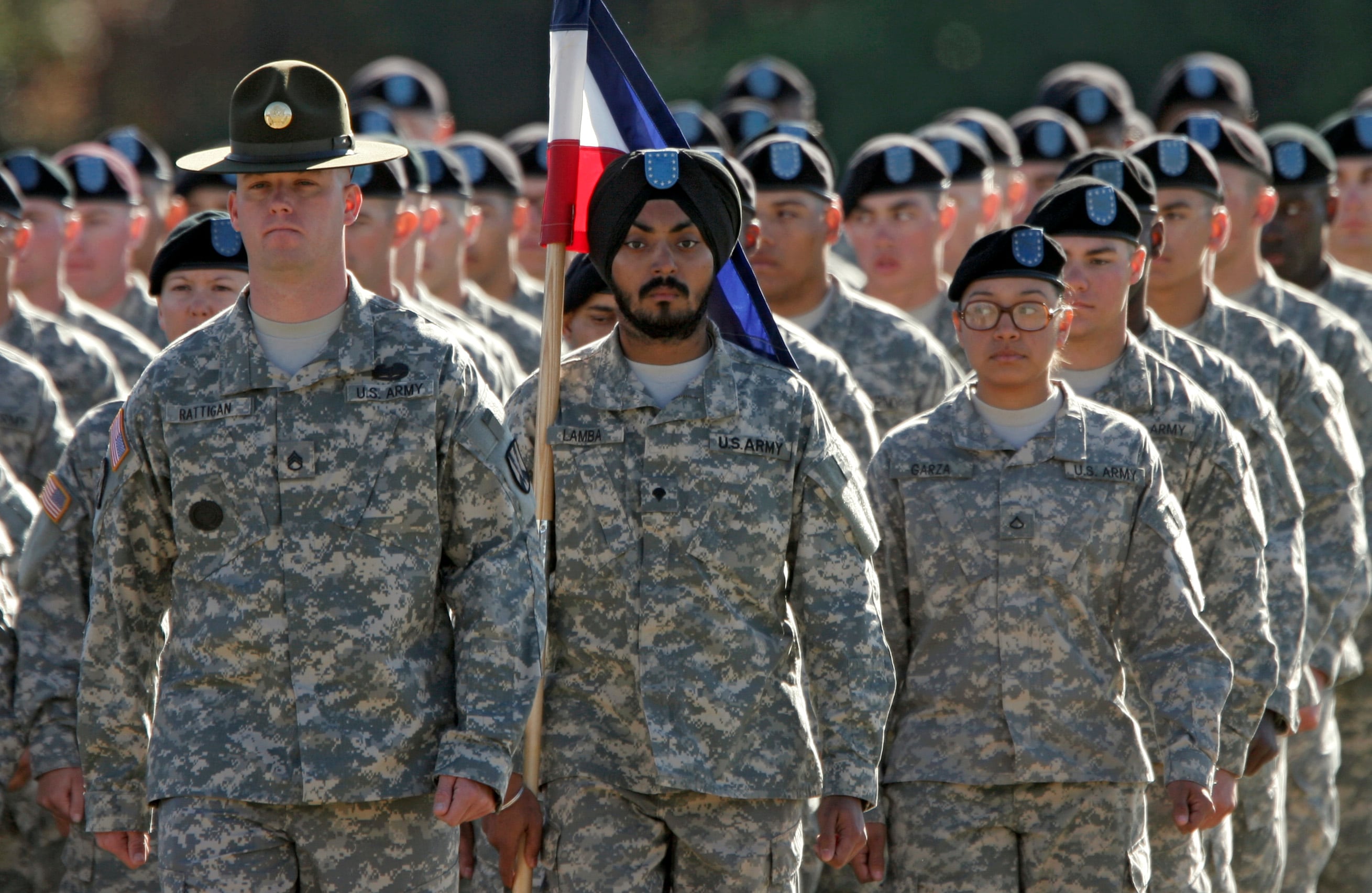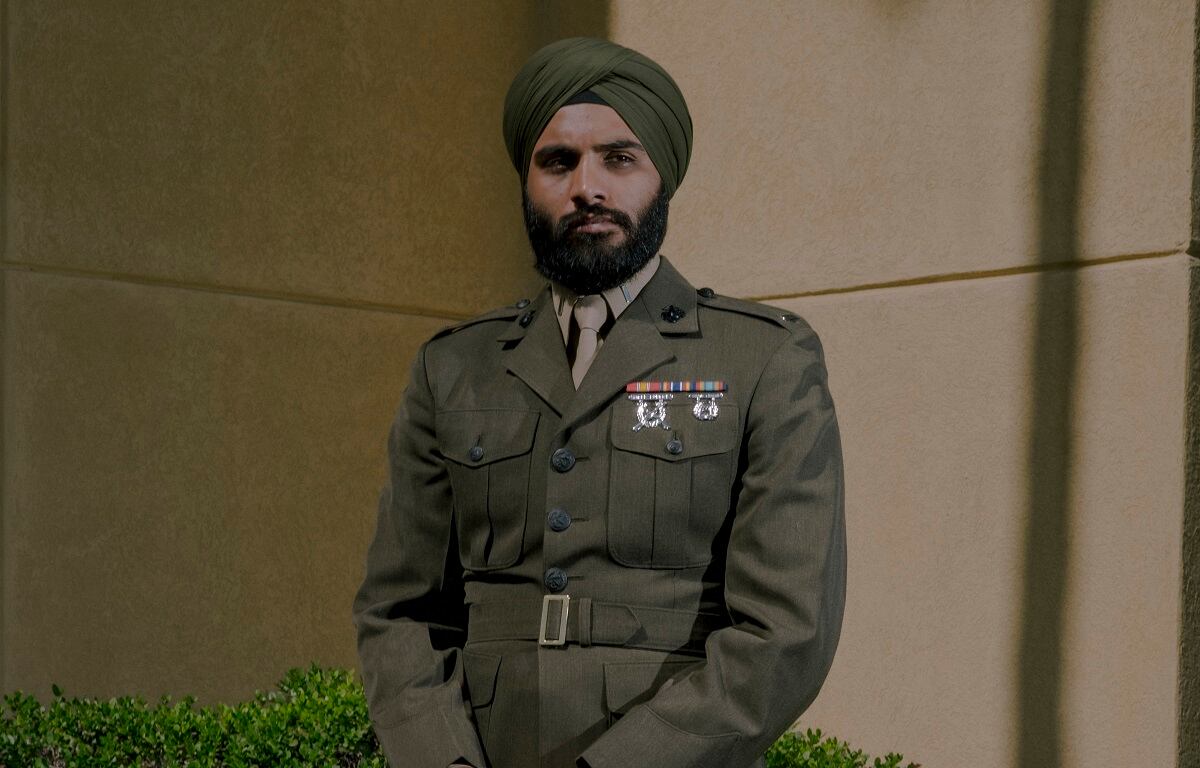A Marine captain and three Marine delayed entry program poolees of the Sikh faith have filed a federal lawsuit challenging the Corps’ decision to not allow the wearing of a traditional turban and beard in either combat zones or recruit training.
Capt. Sukhbir Singh Toor along with Jaskirat Singh, Aekash Singh and Milaap Singh Chahal filed the lawsuit through their attorneys, with assistance from the Sikh Coalition on Monday in the Washington, D.C., federal district court. “Singh,” meaning lion, in the Sikh faith is adopted by men much like a baptismal name in Christianity.
Over the past year, the Marine Corps modified some of its previous practices to allow for Toor and others to keep a beard, turban and articles of faith intrinsic to Sikh religious identity.
However, the lawsuit, reported on by The New York Times and other media outlets, states that remaining restrictions on which the Corps hasn’t yet budged violate Toor and his fellow plaintiffs’ civil rights, primarily First Amendment rights to exercise free speech through the practice of religion.
“We didn’t want to do this, none of us, including our clients, (a lawsuit) is never a goal, it’s absolutely a last resort,” Giselle Klapper, senior staff attorney with the Sikh Coalition, told Marine Corps Times on Wednesday.
RELATED

“We’ve tried for a year now to practically communicate with the Marine Corps, the Department of the Navy,” she said. “We want to make it work, we’re not here to fight you, we’re here to help you.”
That years’ worth of work refers primarily to Toor’s personal campaign, which he initiated on both his behalf and for current and future Sikh Marines, when he was selected for captain in spring 2021.
Warrior heritage
Toor joined the Corps in 2017 and became an artillery officer.
Initially, he did shave his beard and did not wear his turban or articles of faith. That, Toor has said, was primarily because he felt he had to give something of himself to the Corps before asking for the accommodation.
The Sikh faith has a strong tradition of warrior heritage that encourages its members to fight for the oppressed. Military service dovetails closely with that tradition.
The beard, turban and articles of faith such as the “kanga,” a small wooden comb; a “kirpan” or small knife or ceremonial sword; “kachera” a cotton soldier short or longer underwear; a “kara” which is a small steel bracelet and the practice of not cutting their hair or beard, known as “kesh.”
Following his petition, Lt. Gen. David Ottignon, head of Manpower and Reserve Affairs, authored a letter granting Toor permission to wear the turban and unshorn hair, within limits.
At first, Toor was restricted from wearing the turban and articles of faith while assigned to units, such as the on in which he served, 3rd Battalion, 11th Marine Regiment, at the Marine Corps Air Ground Combat Center, Twentynine Palms, California.

Those limits also included a prohibition against wearing those articles while in a dress uniform in a ceremonial position. When later challenged by Toor’s fellow plaintiffs, all three of which were delayed entry program poolees who’d not yet shipped to recruit training, Corps leadership also refused to allow them to attend boot camp without cutting their hair and ditching those articles.
The rationale expressed by Marine leadership for the limits on units rapidly deploying to combat zones was one of safety. That included not being able to properly don and clear a gas mask.
The recruit training restriction had to do with uniformity, a driver of early discipline and unit cohesion instilled in Marines at that entry point to the Corps.
However, Toor and his fellow plaintiffs have pointed out some inconsistencies, in their view, on the Corps’ logic.
The Marines recently relaxed regulations now allowing full-sleeve tattoos. They’ve accommodated skin conditions that prohibit daily shaving such as pseudofolliculitis, or PFB ― a condition that can cause irritation and painful bumps when skin is shaved regularly. It is prevalent among Black men.
That’s not to mention the meme-worthy photos dotting the internet of special operations forces personnel, Marine and otherwise, sporting thick, long beards in the midst of active combat zones and duties.
As of Sept. 23, 2021, Toor and others granted the waiver were allowed to wear their articles, under those limited conditions.
But for the plaintiffs that wasn’t enough.
Toor and his fellow plaintiffs deferred comment for this article to representatives at the Sikh Coalition.
The Marine Corps deferred comment on the lawsuit and the larger issue to the Department of Justice, which handles federal lawsuits. The Department of Justice representative reached by Marine Corps Times on Wednesday declined comment.
Marine Corps Times published previous coverage of this series of events, including a longer profile of Toor in 2021.
Kamal S. Kalsi, president of the nonprofit Sikh American Veterans Alliance and a lieutenant colonel in the Army Reserve, told Marine Corps Times that while the separate Sikh groups won victories through a 2016 lawsuit that pushed the Army to adjust its regulations, they knew that with the Marine Corps it, “would be a difficult conversation.”
While Kalsi heard similar arguments against his own request to wear his articles of faith before he was granted permission to don them in 2016, the question comes down to a simple metric.
“If somebody says, ‘I’m willing to die for you by defending my country, my unit,’ we should allow them to keep their articles of faith,” Kalsi said.
The alliance president said that if the Army and Air Force has figured this out and can make it work, just as allied and partner forces such as Canada, the United Kingdom, India and Australia, then he doesn’t see why the Marine Corps can’t make reasonable changes.

“Either the entire world is wrong or the Marine Corps is wrong,” Kalsi said.
There also is some measure of history here. Troops were allowed to wear a number of articles of faith, including turbans, until regulation changes emerged in 1981, Klapper said. But it wasn’t until Congress passed the Religious Freedom Restoration Act in the early 1990s that troops even had a basis to file a lawsuit.
And Kalsi speaks from experience.
“When I deployed to Afghanistan in 2011 we deployed with Marines; they’re awesome, I love Marines,” Kalsi said.
At the time, he was the chief of the emergency room for the 44th Medical Brigade. They took care of a lot of casualties, many of which were Marines involved in heavy fighting.
Nobody being treated in that field hospital cared that he wore a turban and a beard, he said. They just wanted to know that he knew how to do his job and did it well.
Past precedents may signal future decisions.
A federal judge ruled in favor of the 2016 lawsuit filed by Army Capt. Simratpal Singh. The Army followed suit and expanded not only the permissions for Sikhs but also for Jewish troops wearing the yarmulke and Muslim troops wearing the hijab.

The recent lawsuit by Toor and others names Marine Corps Commandant Gen. David Berger, his assistant commandant, the secretary of the Navy and secretary of defense.
As Klapper noted, the naval services don’t have to wait on a court ruling. The entire lawsuit could end with a decision by any one of the top leaders to end the practice of banning articles of faith being worn in limited conditions.
“Why is this a problem for the Marine Corps?” Klapper said.
*Editor’s note: This article has been updated with the correct spelling of Giselle Klapper’s name and the correct reference to the lawsuit’s plaintiffs.
Todd South has written about crime, courts, government and the military for multiple publications since 2004 and was named a 2014 Pulitzer finalist for a co-written project on witness intimidation. Todd is a Marine veteran of the Iraq War.




